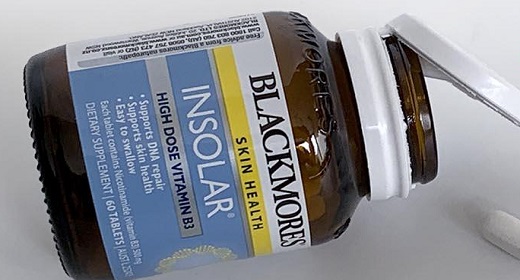Vitamin B3 (nicotinamide) reduces the risk of basal cell carcinoma and squamous cell carcinoma in high-risk people…
Vitamin B3 also treats and prevents solar keratoses (“sun spots”). It is a simple, inexpensive and safe treatment.
How does vitamin B3 work?
Ultraviolet (UV) radiation causes skin cancer by damaging the DNA in cells, reducing the amount of energy available to repair damage, and interfering with the immune system in skin cells. DNA provides “instructions” for cells to grow normally. Damaged DNA can result in uncontrolled growth — skin cancer.
Vitamin B3 helps repair UV-damaged cells and reduce the risk of skin cancer by:
- Making more energy available to cells
- Helping repair damaged DNA, and
- Reducing the immune suppression caused by UV radiation1.
What are the benefits of taking vitamin B3?
Vitamin B3 prevents basal cell carcinoma and squamous cell carcinoma in people at high risk
In high-risk people who have already had a non-melanoma skin cancer, i.e. a basal cell carcinoma (BCC) or a squamous cell carcinoma (SCC), taking vitamin B3 tablets daily reduces the risk of future non-melanoma skin cancer.
The largest trial of vitamin B treatment2 showed that it is an effective and low-risk treatment. At a dose of 500mg twice daily, taken for a year, the rate of new non-melanoma skin cancers was reduced by approximately 23 per cent:
- Basal cell carcinomas were reduced by 20 per cent. Less serious superficial basal cell carcinomas were prevented more effectively than more aggressive forms of basal cell carcinoma1.
- Squamous cell carcinomas were reduced by 30 per cent. This reduction was the same for superficial and more aggressive squamous cell carcinomas.
Some people get better results than this. In an earlier study3, nicotinamide was found to reduce non-melanoma skin cancer rates by up to 75 per cent, but these figures have not been reproduced across larger numbers of patients.
Vitamin B seems to work best in people with the highest levels of risk, i.e. those who have had many BCCs or SCCs previously2.
Oral nicotinamide is now recognised as an important part of the routine treatment of people at high risk of BCC and SCC and is about to become part of the Cancer Council’s national treatment guidelines for BCC and SCC4.
Protection from vitamin B3 only lasts while it is being taken5. In other words, for long term reduction of non-melanoma skin cancer, it needs to be taken indefinitely.
Vitamin B3 treats and prevents solar keratoses
Vitamin B3 is an effective treatment for managing solar keratoses (“sun spots”).
- It helps treat pre-existing solar keratoses6.
- It helps prevent the development of new solar keratoses2.
At a dose of 500mg twice daily, nicotinamide has been shown to reduce solar keratoses by about 35 per cent following two months of treatment. A lower dose of 500mg once daily is also effective, resulting in a 29 percent reduction after 4 months of treatment6.
Vitamin B3 is not a cure for solar keratoses. For the best results, people with advanced or multiple solar keratoses should also use other treatments such as prescriptions creams/ointments (fluorouracil, ingenol mebutate or imiquimod) together with vitamin B3.
Vitamin B3 in people with low immunity
Early studies show that vitamin B3 seems to protect people with poor immunity against basal cell carcinoma, squamous cell carcinoma and solar keratoses5. This has been specifically researched in organ transplant recipients, but the findings may also apply to people with low immunity due to immune-suppressing medications and diseases affecting the immune system such as some types of leukaemia4.
Does vitamin B3 reduce the risk of Melanoma?
The protective effects of vitamin B3 should theoretically also work against melanoma. This protection hasn’t been demonstrated in studies, but this is probably because melanoma is much less common that BCC and SCC. To get significant results, a trial would need to examine many more people over a longer period of time7.
Unfortunately, we don’t yet have evidence that vitamin B3 reduces the risk of melanoma.
Other potential benefits of vitamin B3
Topical vitamin B3 (i.e. applied directly to the skin as a cream) has been shown to reduce visible signs of sun damage and ageing, including pigmentation8 and fine wrinkles9, as well as reducing blotchiness and increasing elasticity10.
Topical vitamin B3 has been shown in an experimental setting to improve skin healing after excision procedures11.
These benefits have not been seen with oral vitamin B3 tablets to date.
Note: Topical vitamin B3 is frequently called niacinamide in product descriptions.
Does vitamin B3 reduce skin cancer risk for people at lower risk?
Vitamin B3 has not been shown to reduce the risk of skin cancers in people at lower risk (i.e. people who have never had a previous skin cancer or solar keratosis). Skin cancer doctors don’t routinely recommend it as a skin cancer prevention measure.
How to take vitamin B3
Vitamin B3 in food

Vitamin B3 is present in small amounts in yeast, meat, fish, eggs, milk, nuts, legumes and cereals12. The average daily requirement for vitamin B3 is 15-20mg1. This is easily met by a balanced diet containing the foods mentioned above. But the amount shown to reduce skin cancer risk is about 50 times this amount and can’t be achieved by dietary intake alone.
Multivitamins and B-complex preparations do not contain adequate vitamin B3 to affect skin cancer risk.
Niacin vs. nicotinamide – which form of vitamin B3 is better?
Vitamin B3 comes in different forms. The most well-known is niacin, famously present in very high amounts in Vegemite12. This form of niacin is also called nicotinic acid. After consumption, it is converted to nicotinamide (sometimes also called niacinamide), the form of vitamin B3 shown to reduce skin cancer. Niacin could be an effective treatment for reducing skin cancers, but even in Vegemite, the dosage is too low to have a clinically useful effect.
A well-known and unpleasant side effect of niacin at high doses is flushing. This is a warmth, redness, itching or tingling that usually occurs on the face, neck, chest and back13. It is not dangerous, and it settles by itself. At the dose required to reduce skin cancer, flushing would almost always occur.
To avoid flushing, make sure you take nicotinamide or niacinamide, not niacin or nicotinic acid.
What dose of Vitamin B3 is best?
The most effective dose is nicotinamide 500mg twice daily, although 500mg once daily is partially effective for treatment of solar keratoses6.
Nicotinamide comes in 500mg tablets. Most of the studies that have proved how well nicotinamide works are based on a dose of one 500mg tablet, twice daily. For convenience, you might choose to take two 500mg tablets once daily, but once daily dosage hasn’t explicitly been shown to be effective.
If you have purchased 100mg tablets, and your pharmacist has advised you to take five at a time, they are possibly niacin and not nicotinamide. You are likely to experience flushing if you take this many niacin tablets
Are there any safety considerations or side effects from taking vitamin B3?
Side effects from nicotinamide are rare at the recommended dosage of 500mg twice daily.
It has been used safely for over 50 years at doses of up to 3000mg per day for the treatment of some conditions. At doses of greater than 3000mg per day, some people report nausea and gastrointestinal side effects14. At even higher doses, liver function can be affected, but it returns to normal after vitamin B3 is discontinued.
Nicotinamide, unlike niacin, is very unlikely to cause flushing14.
Vitamin B3 is not a cure and it does not prevent all skin cancers.
Vitamin B3 does not protect against sunburn. It is not a substitute for sunscreen and other protective measures to reduce UV exposure.
It does not prevent UV damage to skin cells. The most effective way of doing this is to minimise exposure to sunlight when the UV index is greater than 3.
Where can I obtain nicotinamide in Australia?
In Australia, oral nicotinamide is available in products from Blackmores, Herbs of Gold and Nature’s Own. Typically, it costs less than $20 for a month’s supply.
Vitamin B3 tablets are available from Spot Check Clinic Melbourne CBD.
Nicotinamide for topical use is available in many skin preparations, including Solarcare vitamin B3 cream. For people with sun-damaged skin and a history of BCC, SCC or solar keratoses, we recommend SunSense Ultra SPF 50+ sunscreen, which contains nicotinamide.
















































